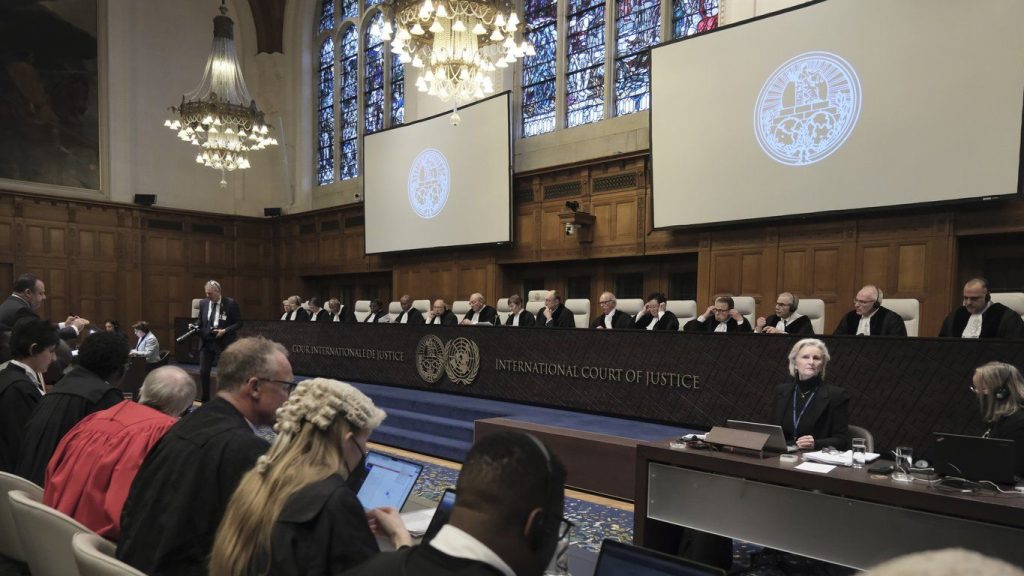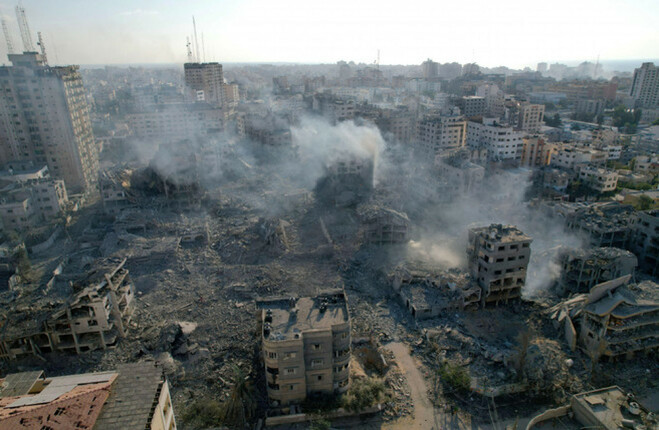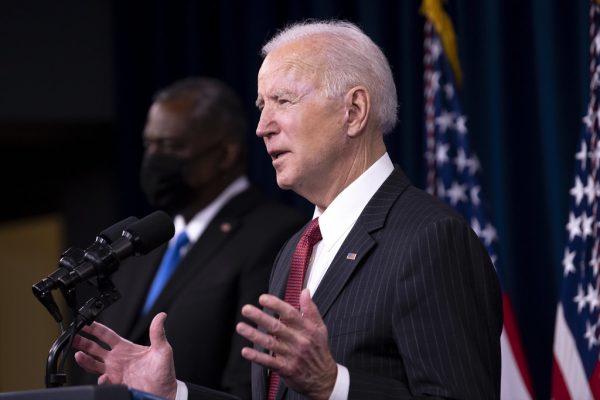Ruling on South Africa’s Israel genocide allegations will have significant impact globally: Calgary academic

Posted January 21, 2024
.
As the International Court of Justice (ICJ) investigates accusations of genocide by Israel amid its ongoing war with Hamas, a Calgary academic says the outcome — whatever it may be — will be significant.
“I see it as a very important historical event,” says Dr. Nazak Birjandifar, assistant professor of history at Mount Royal University. “Either way, it has very significant repercussions.”
Hamas targeted Israel on Oct. 7, 2023, killing more than 1,200 people and taking more than 200 hostages in a series of surprise attacks.
Israel followed by unleashing its attack on Gaza, saying the intent is to root out Hamas — not kill civilians.
In the following months, more than 25,000 Palestinians were killed — some in hospitals and refugee camps — and others forced to flee to other Gaza regions to avoid Israeli troops, according to Gaza’s Health Ministry. Currently, humanitarians claim many Palestinians are on the brink of starvation as the crisis continues.
Earlier in January, South Africa condemned Hamas for its attack on Israel while making the case to the ICJ that Israel’s aggression amounts to genocide.
Israel is standing firm in its stance that it has the right to defend itself, with Prime Minister Benjamin Netanyahu saying he is resolved to continue until Hamas is destroyed.
“The hope is the ICJ will step in and declare some sort of ceasefire or put an end to this conflict,” Birjandifar said. “Destroying Hamas, I feel, is more of a hope or a desire than something that will actually happen.”
While Canada supports the ICJ and its “process,” Prime Minister Justin Trudeau stopped short of supporting genocide allegations.
Birjandifar says an ICJ ruling agreeing with South Africa will be a significant way to create a historical record on a war that has met with a conflicted international response.
“The ruling can take a few years but South Africa is asking for emergency provision to halt the military campaign, which could save lives,” she said.
She says countries like the United States and Canada have been reluctant thus far to openly condemn the Israeli military operation — something which could change if the ICJ decides the conflict needs to be immediately stopped.
If the ICJ rules it is not genocide, Birjandifar feels will reflect poorly on the international body, further demonstrating the assertion by some that it has biases and an unwillingness to bring accountability to western leaders and allies.
“It is difficult to enforce these decisions without support of great powers, but it will also be very difficult for countries like the U.S. and Canada to ignore if it rules as genocide,” Birjandifar said. “I think for western democracy to remain intact as supporters of human rights and a system where we have continually told the world, ‘we protect human rights and act against terrorism and genocide,’ it would be very much hypocritical to not take the ICJ ruling seriously.”
While the war between Hamas and Israel stems from decades of conflict, Birjandifar says the current hostility sees a marked shift.
Israeli hostages remain in captivity
Hanging in the balance, along with the lives of Palestinians caught in the ongoing war, is the fate of Israeli hostages still in captivity.
Israel says 132 people remain unaccounted for after they were abducted and taken to Gaza during the October attacks. Up to 25 of the hostages are believed to be dead and 105 were released by Hamas during a six-day ceasefire in November.
“I’m not sure Israel is going about it in a way that is going to get the hostages back,” Birjandifar said. “It makes you wonder if the hostages will survive this.”
The upcoming ruling by the ICJ “will potentially redefine roles of the international institutions in terms of trying to navigate and mediate the conflict,” according to Birjandifar.
-With files from The Associated Press

Irish Government will 'consider' joining genocide case against Israel after preliminary stage
TÁNAISTE MICHEÁL MARTIN has defended the Government’s stance in relation to a case taken by South Africa accusing Israel of genocide at the International Court of Justice (ICJ), and said Ireland would consider joining the case once it had passed the preliminary stages.
South Africa has taken the case over Israel’s actions in Gaza, where 25,000 people have been killed since October last year, according to local health authorities.
Speaking to RTÉ’s This Week programme, Martin said:
“South Africa have taken a preliminary case to the court (ICJ), Israel have responded, no-one has actually joined that case yet, nor can anyone join it right now – not even Palestine.
“Because the court is going to make a provisional judgment on that to respond to what South Africa has sought, which is exactly what we have sought, the same thing: an immediate cessation of hostilities and war, unimpeded access of humanitarian aid into Gaza.
He said that Ireland would act the same way it did in relation to an ICJ case where Ukraine accused Russia of violating the Genocide Convention.
Martin said they examined the legal case for around 12 weeks before joining Ukraine’s case.
“And we will give this very serious consideration, of course,” he said of South Africa’s case.
“Because these are legal conventions, it will take years to resolve, meanwhile, we have to keep our focus on getting a ceasefire.”
Under pressure
The Government is under pressure to support the case, with opposition party the Social Democrats set to introduce a Dáil motion next week calling on the Irish Government to support South Africa’s case.
Party leader Holly Cairns said the country “cannot stand idly by while the daily slaughter of innocent civilians in Gaza continues”.
“Since Israel began its military operations three months ago, nearly 100,000 Palestinians have been killed, reported missing or wounded in Gaza. Almost 25,000 people have now been confirmed dead, two thirds of whom are women and children,” she said.
She said that Ireland under Article 1 of the Genocide Convention parties to the convention have an obligation to take measures to prevent genocide.
“The Tánaiste has indicated that the Government will await a ruling by the ICJ in relation to provisional measures before considering if Ireland should intervene in the case,” Cairns said.
However, the people of Gaza do not have the luxury of time. While the Irish State awaits a decision by the court, which will be followed by a period of analysis and consultation by the Government, an average of 250 Palestinians are being killed every day.
Martin has also come under pressure from his own MEPs, with Barry Andrews and Billy Kelleher both telling TheJournal earlier this month that Ireland should have joined the case.
In the interview today, Martin also said that Israel “has to be held to account” as Palestinian deaths in the Gaza enclave reached 25,000, according to local health authorities.
“Israel has to be held to account in terms of what it’s doing,” he said.
“I condemn the continued bombardment of Gaza. It is shocking. It’s horrifying. It’s not justified in any shape or form.”
With reporting from Press Association
In 1948, the newly-formed United Nations marked the signing of the Universal Declaration of Human Rights as well as The Convention on the Prevention and Punishment of the Crime of Genocide. The Genocide Convention was a response to WWII’s Holocaust, when six million European Jews were murdered by Nazi Germany. Raphael Lemkin, a Polish lawyer of Jewish descent, coined the term “genocide” during the war, as he developed legal arguments for prosecuting war criminals, leading to the Nuremberg Trials.
1948 was also the year Israel was founded. While many celebrated Israel as a safe refuge for the world’s Jews after the Holocaust, Palestinians call that period the ‘Nakba,’ Arabic for ‘catastrophe.’ Over 750,000 Palestinians were driven from their homes and villages, their property confiscated, and 15,000 were killed.
1948 was also when the white minority in South Africa imposed apartheid on the Black majority, creating an oppressive system of segregation that lasted close to half a century.
In the intervening 75 years, despite the Genocide Convention, genocides have still occurred – and too few perpetrators of genocide have faced prosecution. Last week, the eyes of the world were on the Hague, as South Africa brought a case accusing Israel of genocide in Gaza to the International Court of Justice (ICJ).
The ICJ, also referred to as the “World Court,” convened on January 11th, first hearing South Africa’s case, followed the next day by Israel’s defense. South African lawyer Adila Hassim opened, saying,
“For the past 96 days, Israel has subjected Gaza to what has been described as one of the heaviest conventional bombing campaigns in the history of modern warfare. Palestinians in Gaza are being killed by Israeli weaponry and bombs from air, land and sea. They are also at immediate risk of death by starvation, dehydration and disease as a result of the ongoing siege by Israel, the destruction of Palestinian towns, the insufficient aid being allowed through to the Palestinian population, and the impossibility of distributing this limited aid while bombs fall. This conduct renders essentials to life unobtainable.”
Another of South Africa’s legal team, Irish lawyer Blinne Ní Ghrálaigh, said,
“On average, 247 Palestinians are being killed and are at risk of being killed each day, many of them literally blown to pieces. They include 48 mothers each day. Two every hour. And over 117 children each day, leading Unicef to call Israel’s actions a war on children. Entire multigenerational families would be obliterated. And yet, more Palestinian children would become WCNSF. Wounded Child, No Surviving Family, the terrible new acronym born out of Israel’s genocidal assault on the Palestinian population in Gaza.”
Israel said its attack on Gaza was in self-defense, directed at Hamas’ military infrastructure, following its October 7th attack on Israel, in which over 1,000 people were killed and over 200 taken hostage.
Renowned Jewish Israeli journalist Gideon Levy said on the Democracy Now! news hour, “Does this give us Israelis the right to do anything we want after the 7th forever, without any limits, no legal limits, no moral limits? We can just go and kill and destroy as much as we wish? That’s the main question right now.”
Levy serves on the editorial board of the Israeli newspaper Haaretz. He recently wrote a column headlined, “If It Isn’t a Genocide in Gaza, Then What Is It?” In it, he writes, “Let us assume that Israel’s position at The Hague is right and just and Israel committed no genocide or anything close to it. So what is this? What do you call the mass killing, which continues even as these lines are being written, without discrimination, without restraint, on a scale that is difficult to imagine?”
Any measures ordered by the ICJ would have to be adopted by the United Nations Security Council, where the United States, Israel’s staunchest ally and weapons provider, regularly wields its veto to protect Israel.
The United States is quick to accuse others of genocide, from Serbia in the 1990s, to Burma in the last decade for its atrocities against its Rohingya minority, to the mass imprisonment of Uyghurs in China, to Russia’s invasion of Ukraine. The United States even acknowledged Turkey’s 1915 genocide against Armenians, albeit in 2021, more than 100 years late.
Yet, President Biden, in a statement marking the 100th day anniversary of Hamas’ attack on Israel, failed to even mention the more than 24,000 Palestinians killed by Israel in Gaza, 70% of whom were women and children. Secretary of State Antony Blinken in Davos, Switzerland said the situation is “gutwrenching” and asked, “but what can be done?”
If President Biden demanded an end to the bombardment of Gaza, it would stop. Now is the time to heed the global calls for a ceasefire in Gaza.

No comments:
Post a Comment